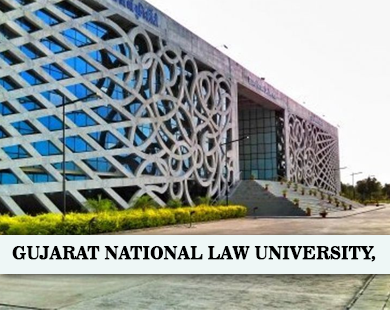The GNLU International Moot Court Competition (GIMC) was launched in 2009 with the objective of creating a platform for testing the legal acumen and potential of law students globally. For a decade, GIMC has served as a unique platform for law students to explore nuances of international trade law and hone their research and advocacy skills. 28 teams have gathered from all around the world to battle for the prizes! GIMC is the only trade law moot in India that simulates a WTO dispute redressal mechanism and this has consistently attracted a number of bright legal minds.
The moot is conducted by the GNLU Moot Court Committee (MCC), through an organising committee of more than 100 members, along with support from the Director, Professor Dr. S. Shanthakumar and assistance from the Faculty Convener, Dr. Girish R. We have received support from World Trade Institute – Bern, as the organisational partner, Centre for WTO Studies – Indian Institute of Foreign Trade as the national academic support partner, Centre for Trade and Investment Law – Indian Institute of Foreign Trade as the institutional partner, and EBC-SCCOnline as the knowledge partner.
Each edition of the GIMC sees enthusiastic participation not only from Indian universities, but also universities across the globe, from countries including Afghanistan, Australia, Bangladesh, Hungary, Indonesia, Kenya, Maldives, Mauritius, Nepal, Nigeria, Pakistan, Philippines, South Korea, Singapore, Sri Lanka, United Kingdom, United States of America, and Vietnam.
The Winners and Runners-up of the 14th edition will receive cash prizes of INR 50,000 and INR 25,000 respectively, in addition to other awards and opportunities from our collaborators. The Best Orator (Final Round), the Best Orator (Preliminary Rounds), the Best Written Submissions and the Best Researcher will also be felicitated with awards.
Day 1 | Inaugural Ceremony
3:55PM: The air is abuzz with excitement at the inauguration ceremony of the 14th GIMC, due to begin shortly. Anticipating the welcome of the our chief guests, the 17th and current Speaker of the Lok Sabha, Shri Om Birla and Hon’ble Minister of Law and Justice of Gujarat, Shri Rishikesh Patel! Stay tuned for updates on the ceremony!
4:30PM: The ceremony has begun with the traditional lighting of the lamp by chief guests Shri Om Birla and Shri Rishikesh Patel, the Director, Professor Dr. S. Shanthakumar, the Registrar (I/C), Dr. Jagadeesh Chandra T. G., and the Head of Academic Affairs, Dr. Anjani Singh Tomar, symbolising the dispelling of darkness and the welcoming of light!
4:50PM: Followed by the welcome speech to the event given by the Director, Professor Dr. S. Shanthakumar, Dr. Girish R., the Faculty Convenor of the MCC took over the dais. He spoke about the contribution of GIMC to the mooting world. Next to address the crowd was the Head of Academic Affairs, Dr. Anjani Singh Tomar, who highlighted the importance of inculcating mooting and research culture, and the role it plays in learning the law.
5:10PM: Next, the crowd welcomed with great enthusiasm the Speaker of the Lok Sabha, Shri Om Birla. He spoke about having a career in law, and congratulated the students and participants on choosing to pursue law. Tracing the great heights of achievements created by lawyers of the country, particularly Mahatma Gandhi and Sardar Vallabhbhai Patel, he spoke about the immense potential which a career in law holds.
He further shared his recent experience in Tanzania, where he realised the talent, potential and character which Indians hold across the world, attributing the same to the contribution and success of the Indian education system. Addressing the audience about vastness of law, he underlined the enormous importance law holds in society. Lastly, the Hon’ble Speaker urged the future lawyers to analyse and assess legislations and provide valuable contributions to strengthen our democracy.
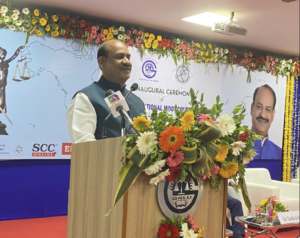
5:30PM: The inauguration ceremony ended with a vote of thanks given by Dr. Jagadeesh Chandra T. G., Registrar (I/C). Lined up next for the participants is the orientation ceremony, where they will be briefed about rules of the competition.
5:50PM: The orientation session for the participants was taken by the Heads of Logistics, Mathangi K and Nisarg Bharadwaj, and the Chief Scorer, Jagrat Shah. The participants were given a brief overview of the general rules of the oral rounds and memorial exchange, structure of the competition for the preliminary, semi-final and quarter-final rounds and scoring pattern.
6:10PM: The registration desk has been set up and team registrations have commenced. The participants are being given their folders, T-shirts and some yummy pastries! 
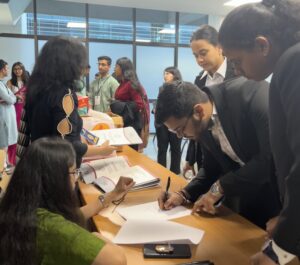
7:00PM:After the refreshments the researcher’s geared up for the researcher’s test.The researcher’s test is a crucial component of the moot court competition as it evaluates the participants’ ability to perform legal research, a critical skill for any legal professional. The fifth year students of the 2018-23 Batch Kaarunya, Vaibhavi, Dhruv, Shivaang, Saikishan, Abhishek turned into invigilators and assisted by invigilating during the research’s test. Let us see who heads up to win the coveted best researcher’s award based on their performance in the researcher’s test.
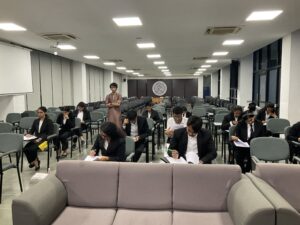
7:30PM:After a long day, the participants finally got a chance to unwind and socialize over a delicious dinner. The participants left the dinner with a sense of renewed energy, ready to take on the challenges of the next day of the competition.
Day 2 | Preliminary Rounds I
9:30AM: The much awaited first day of GIMC started with a scrumptious breakfast that provided the participants with the energy they needed for the long day ahead. As the time for the preliminary rounds is drawing near, the tension and excitement among the participants can be seen rising. The teams can be seen rehearsing their arguments, discussing legal principles, and reviewing their research materials.
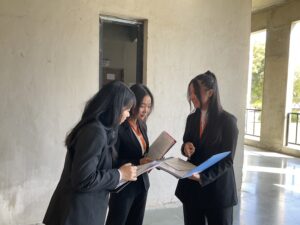
11:00AM: The preliminary rounds have set the stage for the teams! The atmosphere in the moot court halls is charged with energy and excitement. The teams have prepared extensively and are now presenting their arguments in the preliminary rounds. Each team is given thirty minutes to present their argument and respond to the questions of the judges. The judges are seasoned legal professionals, and are listening attentively to the arguments presented by the teams. They are asking probing questions and challenging the participants to defend their legal arguments with sound reasoning and persuasive advocacy.
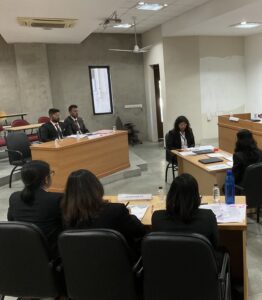 1:00PM: After the preliminary rounds, the participants and the organizing committee members take a break to enjoy a delicious lunch. The lunch is a lively and convivial affair, with participants and organizers exchanging stories and opinions over plates of delicious food. Overall, the lunch is a welcome break for the participants and the organizers, providing an opportunity for them to recharge and refocus before the next round of the competition.
1:00PM: After the preliminary rounds, the participants and the organizing committee members take a break to enjoy a delicious lunch. The lunch is a lively and convivial affair, with participants and organizers exchanging stories and opinions over plates of delicious food. Overall, the lunch is a welcome break for the participants and the organizers, providing an opportunity for them to recharge and refocus before the next round of the competition.
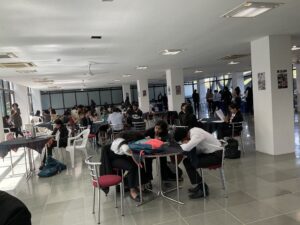
2:00PM: As the lunch break ends, everyone gathers at the preamble for a group photo. The participants, and OC come together to take a picture, capturing the spirit of the competition and the camaraderie of the event. The photo is taken, and everyone applauds and cheers, happy to have been a part of such a memorable event. The participants and organizers disperse, energised and ready to continue with the competition, and to make the most of the remaining rounds.
2:45PM: Well rested, the participants geared up to appear for the next rounds of prelims and all five prelim courtrooms are now in session! The teams are presenting compelling legal arguments on both sides, and the judges are actively engaging with the participants during the rounds, posing challenging questions and engaging them in discussion with the legal issues of the dispute.
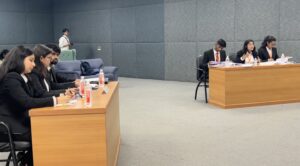
4:30PM: The second slot of preliminary round 1 reaches to an end. The discussions during the rounds were lively and informative, with both the participants and the judges showing a deep understanding of the complex legal issues involved! The judges are providing valuable feedback on the participants’ arguments and had challenged them during the rounds to think critically about the legal and policy implications of their positions. Overall, the discussions provided a great opportunity for the participants to showcase their legal knowledge and analytical skills!
5:00PM: The final set of preliminary rounds is underway, with the participants engaged in the last leg of the competition. The mood is electric, with everyone on edge as they realize that these rounds could determine their fate in the competition. In their respective rooms, the judges are attentive and focused, evaluating each team’s arguments and weighing their legal knowledge and skills.
6:00PM: After the completion of the first set of preliminary rounds, the participants and organizers take a short break to recharge and refuel. Small snacks and refreshments are served, providing a quick and easy way for everyone to grab a bite to eat and to take a breather before the next set of rounds.
8:00PM: After a long day of intense competition and activities, day 2 of the moot court competition comes to a close. As the day draws to a close, the participants and organizers come together to enjoy a well-deserved dinner. The participants and organizers retire to their rooms, recharged and ready to face the challenges and opportunities of the remaining rounds.
Day 3 l Preliminary Rounds II
9:00AM: Day 3 of GIMC starts early with a scrumptious breakfast served to the participants and organizers. The breakfast provides a much-needed boost to the energy levels of everyone after the long and productive day 2. As they eat, the participants gear up for the second preliminary rounds, making final preparations and discussing strategy with their team members. They are eager to continue competing and to put into practice the feedback and insights provided by the judges.
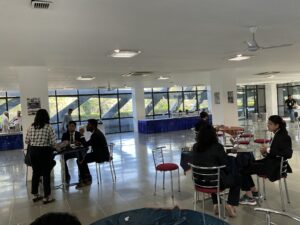
9:30AM: The organisers and volunteers are busy, ensuring that everything is in order for the second preliminary rounds. They review the schedule, check the technology and equipment, and make any necessary last-minute adjustments to ensure that the competition runs smoothly. The atmosphere is electric as the participants and organisers prepare for the next set of rounds. The air is filled with excitement and anticipation as everyone waits for the signal to start.
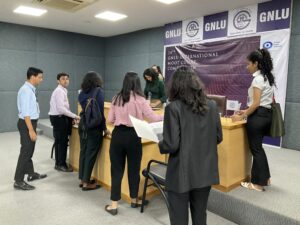
10:30AM: After the breakfast, the participants gear up for the second set of preliminary rounds. The judges gather in their respective rooms, ready to evaluate the performances of the participants. The participants take their seats, ready to present their arguments and engage in legal debate once again. The atmosphere is tense, with everyone aware that these rounds are critical to determining who will advance to the next stage of the competition.
2:00PM: The aroma of the food wafts through the air, as the participants queue up for their meals. The participants fill their plates, sitting down at the tables to enjoy their meals and engage in conversation with their teammates and fellow competitors. The atmosphere is relaxed and jovial, a welcome reprieve from the intensity of the competition.
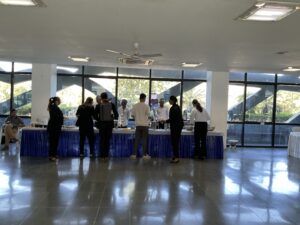
3:30PM: As the second set of the second preliminary rounds progresses, the participants remain focused and determined, giving their all in pursuit of moot court glory. The atmosphere is tense, yet also supportive, with participants from different teams rooting for one another and encouraging their fellow competitors.
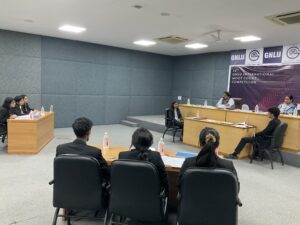 5:00PM : As the final rounds of the moot court competition come to a close, the anticipation and excitement in the air is palpable. The participants have worked tirelessly. During the competition, it’s important for the participants to stay nourished and hydrated, especially given the long hours of mooting. To help keep the participants energized, the organizers provide snacks giving the participants a boost of energy and helping them stay focused and sharp.
5:00PM : As the final rounds of the moot court competition come to a close, the anticipation and excitement in the air is palpable. The participants have worked tirelessly. During the competition, it’s important for the participants to stay nourished and hydrated, especially given the long hours of mooting. To help keep the participants energized, the organizers provide snacks giving the participants a boost of energy and helping them stay focused and sharp.
8:15 PM: As the participants gather for dinner, there is a buzz of conversation as people discuss their experiences and speculate about their chances of success. Charged with emotion, the participants are waiting anxiously to hear how they fared in the prelim rounds conducted earlier today, and are eager to find out whether they will advance to the next stage of the event!
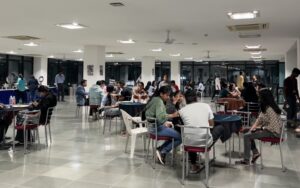
8:30PM: After weeks of hard work, research, and advocacy, the participants were eager to find out if they have made it to the next round of the competition. As the names of the successful teams were announced, there was a mix of cheers, applause, and disappointment, as some participants celebrated their success while others came to terms with their elimination. After the result announcement, the team code allocation through a draw of lots added another layer of excitement as the participants gathered around to witness it. With the announcement, the day came to an end as the participants navigate the highs and lows of the competition and prepare for the challenges ahead!
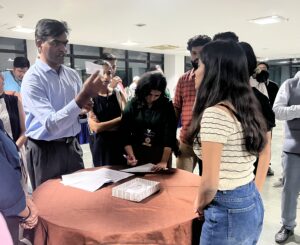
The below-mentioned teams made it through the preliminary rounds!
- Army Institute of Law, Mohali
- ILS Law College, Pune
- Institute of Law, Nirma University, Ahmedabad
- NALSAR University of Law, Hyderabad
- National Law Institute University, Bhopal
- National Law School of India University, Bangalore
- Royal Institute of Law and Economics, Cambodia
- Symbiosis Law School, Pune
Congratulations to all teams!
Day 4 l Quarter-Finals Semi-Finals IIl
9:00AM : The morning of day 4 is filled with excitement as the participants gear up for the quarter-finals and semi-finals of the moot court competition. The intensity of the competition has reached new heights, and the stakes are higher than ever. The participants arrive early and begin preparing for their upcoming rounds, reviewing their arguments, strategising, and mentally preparing for the challenges ahead. The air is charged with a sense of anticipation and nervous energy, as the participants know that the competition is only going to get tougher from this point on.
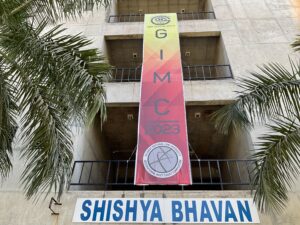
9:30AM: The participants begin their day by enjoying a delicious breakfast spread. Some teams are huddled in quiet preparation, going over their notes and practicing their arguments one last time. Others are engaging in lively conversation. As they finish their breakfast and prepare for the upcoming rounds, the participants know that they will need to bring their A-game if they want to advance to the next stage of the competition. But with full bellies and strong minds, they are ready to take on the challenge and showcase their skills in the courtroom.
11:00AM: As the fourth day of the moot court competition begins, there is a buzz of excitement and anticipation in the air. The quarter final rounds have commenced and the participants are preparing to give it their all. The first round of the quarter finals have begun and the teams can be seen feeling nervous and excited as they prepare to argue before the panel of judges!
1:00PM: The atmosphere during the quarter-finals is intense and competitive, as the stakes are higher for the teams that have advanced. The participants are presenting their arguments whilst the judges listen intently, take notes and occasionally interrupt with probing questions to test the participants’ knowledge and understanding of the law!
3:00PM: The quarter final rounds have now concluded successfully by all court rooms! The atmosphere was intense and competitive as participants battled for a place in the semifinals. The arguments presented by the participants were of high standard, and the judges seemed impressed with the quality of legal reasoning displayed by the participants. The judges actively engaged with the participants and challenged them with thought-provoking questions, which helped to further refine their arguments! After the conclusion of the quarterfinal round, participants have now taken a break for lunch.
3:25PM: The participants were eagerly awaiting the announcement of the results, and the tension in the room was palpable. As the judges concluded their deliberations, the team was prepared to announce the winners of the quarterfinal round. The names of the participants who had advanced to the semifinals was announced, and the room erupted in applause! The participants who advanced to the next round were ecstatic and relieved, while those who did not make it to the semifinals were disappointed but gracious in their defeat.
Teams representing the below-mentioned universities have qualified for the semi-finals, congratulations to them all!
- Army Institute of Law, Mohali
- NALSAR University of Law, Hyderabad
- National Law Institute University, Bhopal
- National Law School of India University, Bangalore
4:00PM: The court room officers play a vital role in ensuring that the competition runs smoothly and that the participants have a fair and impartial experience. With the court room officers in place and everything set up, we are ready to go for the semi finals!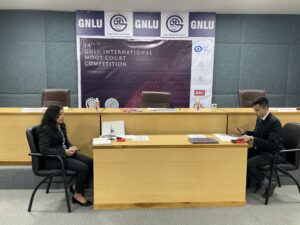
5:30PM: The semi-final rounds have commenced and the atmosphere feels quite tense and competitive as the remaining teams vie for a spot in the final round. There is a mix of competition, collaboration, and intensity, as the teams strive to demonstrate their knowledge and advocacy.
6:30PM: As the semi-final rounds progress, participants can be seen presenting clear and persuasive arguments whilst the panel of judges asks probing questions and challenges the arguments presented by the teams. The judges seem to be paying close attention to the arguments presented by each team and evaluating their strength.
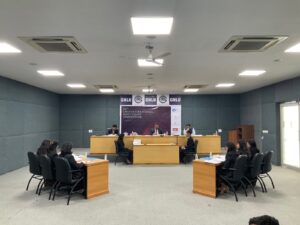
7:45PM: As the judges provide some constructive feedback to the teams, the semi-finals draw to an end. The teams are now headed to the certificate distribution ceremony, whilst eagerly awaiting the results of the very intense semi-final round!
8:00PM: After the end of an intense semi-final round, the scoring team has now gotten to work to analyse and sum up the scoring of the teams to declare the results for later in the evening. The participants can be seen nervous and excited to know the results of their hardwork!
8:15PM: The certificate distribution ceremony is about to start and the participants are on the edge of their seats to know the results! The participants are all seated with a nervous air present around them. The director, Prof. (Dr.) Shantakumar along with the registrar Dr. Jagdeep Chandra T.G. take the stage to present the result!
Teams presenting Army Institute of Law, Mohali and NALSAR University of Law, Hyderabad made it through the finals. Big congratulations to both teams!
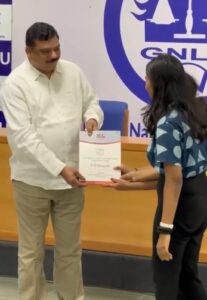
8:30PM: Ms. Corrine Karlagnis from the World Trade Institute, Bern now makes a presentation on the background and core activities of the WTI. She discusses various programs, research and academic activities undertaken by the WTI and how it is contributing to the field of Trade Law. She further talks about the academic and positive environment in the World Trade Institute and how one can redress any of their queries given the approachable faculties and mentorship program.
9:00PM: After the end of the ceremony, the participants and the organisers take the much needed break by having dinner and calling it a day, looking forward to a long day of finals coming up which would decide the winner of the 14th GNLU International Moot Court Competition tomorrow!
Day 5 l Final Rounds
9:00AM: The Sunday morning at GNLU started with zeal and passion to excel and win the trophy of 14th GNLU International Moot Court Competition. We wish all the luck to the qualifying teams to do well!
10:00AM: The panel of judges for the awaited final rounds of the GIMC arrive.The panel consists of stalwarts in the area of International Trade Law and textbook authorities including Santanu Mukherjee, Head of Chambers, Ex Lege Chambers New Delhi, Prof. (Dr.) James Nedumpara, Professor and Head of the Centre for International Trade and Investment Laws, Mr. Sanjay Notani, Partner at Economic Law Practice, Ms. Anuradha RV, Partner at Clarus Law Association, and Ms. Pallavi Bajaj, Global Trade Policy Analyst.
10:05AM: The finals round of the 14th GIMC has now begun and the complainants have started their arguments. The panelist asks the complainants to skip ahead to the issues of the dispute since they are aware of the facts of the matter.
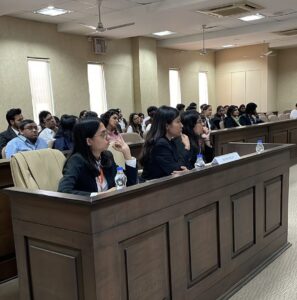
10:17AM: With ten minutes left for the first speaker of the Claimant’s team to speak, the complainants are seemingly nervous due to the constant questioning by the panelists.
10:30AM: The second speaker of the Claimant’s team leads the panel to various parts of the SPS Agreement and of the moot proposition to support her propositions of there being de facto discrimination in applying the cautionary labelling requirement as domestic Ilish is regularly sold without the cautionary label in Nagori’s local wet markets
10:35AM: Upon queries raised by the panel, the speaker suggests interim measures related to the packaging which may be taken by Respondent to remedy the issue. Counsel further moves to her second limb of arguments, making contentions regarding the discriminatory application when it comes to labelling requirements by the Respondent.
10:45AM: Attempting to step into the shoes of the consumer, and the counsel explains the panel how the deficiencies of the Respondent would also impact the mindset of the consumers and mislead them. The counsel is again being constantly questioned by a rather active panel of judges.
10:50 AM: The counsel on behalf of the Claimant then contends for there to have been a de facto discrimination. The counsel further contends that the enhance testing requirement are not based on risk assessment, and does not amount to being categorised as a valid risk assessment.
10:55AM: As the counsel on behalf of the Claimant concludes her arguments, the panel takes a few seconds to discuss the arguments made by the Claimant’s team. The first speaker of the Counsel on the behalf of the Respondents now proceeds to introduce the structure of her arguments to the panel.
11:00 AM: Noticing the counsel not diving into the key issues of the dispute, the panel asks the counsel to discuss the Claimant’s contention of the Respondent’s guarantee itself being discriminatory due to exclusion of its applicability to its domestic partners.
11:05 AM: The panel further directs enquires towards the counsel as to why the Respondent is not agreeable to the alternatives of reasonable measures such as revitalisation, as suggested by the Claimant.
11:15 AM: As the first speaker from the Respondent’s team concludes her submission, the second speaker beings to briefly inform the panel about the structure of her arguments, highlighting the four legs of the arguments she will be making.
11:25 AM: The counsel presents her submissions on enhance testing requirement being supposedly based on valid risk assessment. The counsel further spoke about the requirement is not restrictive in nature and has been applied only to the extent necessary.
11:35 AM: Even after completion of the allocated time to the counsel, the panel continued to question the counsel and wanted to know conclusively understand the stance of the Respondent on the non implementation of the labelling requirement for the raw fish being sold in the country. The counsel attempts to answer the question, however, on missing to come to the crux of the questioning, the panel directed the counsel to answer the same.
11:40 AM: Upon having a lack of clarity with regards to the stance of the Respondent on various issues, the panel continues to question the counsel in order to better understand the position of the Respondent. The panel moves on to the final question directed towards the counsel on behalf of the Respondent.
11:49 AM: The rebuttals have now begun. The counsel on behalf of the Complainants highlights that the contention made by the Respondent of the act not being attributable to Nagori is incorrect, and highlighted the case of Russia and EU cited by the Respondent team in their arguments. The counsel further speaks about risk assessment and underscores the difference plausibility and possibility in the issue. Lastly, the counsel touches upon the procedural discrepancies with respect to poultry products.
11:55 AM: It is now time for the counsel on behalf of the Respondents to revert. The counsel attempted to uphold the Russia-EU analogy as cited by them to support their contention of the act not being attributable to Nagori. The counsel further claims for the counsel on behalf of the Complainants to have entirely misunderstood the essence of risk assessment. On further attempts on rebut the contentions made by the opposing counsel during the rebuttal, the counsel concluded the rebuttal round, and with that, the last round of the 14th GIMC.
12:10 PM: After the completion of a fierce finals round, the audience and the participants leave the moot court room to find a perfect seat for the valedictory ceremony, whilst the judges and the scoring team stay back to analyse the arguments and decide the winner for the 14th GIMC!
12:30 PM: As we await the final verdict from the judges, let’s take a moment to appreciate the stunning trophies that will be awarded to the winning teams. Crafted with precision and care, these trophies are a true embodiment of excellence and will serve as a testament to the hard work and dedication put forth by the winners. The intricate designs and beautiful finishes make these trophies a sight to behold, and any team would be proud to display one. We can’t wait to see who will walk away with these pretty trophies and the bragging rights that come along with them! Stay tuned for the final results.
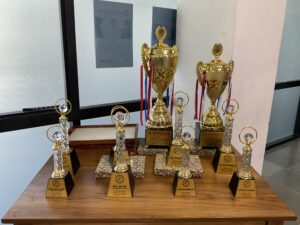 12:45PM: The judges of the moot court competition were treated to a special flecitation by Prof Dr. Shantakumar, who personally felicitated them with a small box of gift.
12:45PM: The judges of the moot court competition were treated to a special flecitation by Prof Dr. Shantakumar, who personally felicitated them with a small box of gift.
The judges were visibly touched by this kind gesture, and it was heartening to see the smiles on their faces as they received their boxes.
12:50PM: Prof Dr. James Nedumpara, began his speech by expressing his gratitude for being associated with the competition for many years. He then went on to praise the event as one of the finest competitions in the field of trade law, and acknowledged the hard work and dedication that goes into organizing such an event. He further emphasized the importance of trade law and its relevance in today’s globalized world. He spoke at length about the amount of effort that goes into negotiating trade deals and the significant impact that these deals have on countries, businesses, and individuals alike. He emphasized the critical role that young and talented trade lawyers play in shaping the future of trade law, and encouraged the participants to continue honing their skills and striving for excellence in their careers. Prof Dr. Nedumpara ended his speech on a positive note, stating that the future of trade law is bright and filled with opportunities for those who are passionate about the subject. He commended the participants for their hard work and dedication, and wished them all the best in their future endeavours.
1:00PM: Ms. Anuradha RV, began her speech by expressing her delight at seeing that both of the final teams were composed entirely of women. She praised both the teams to be women comprised and encouraged more women to take an interest in trade law and pursue careers in the field. Ms. Anuradha RV then delved into the subject of trade law, highlighting its relevance and significance in today’s global economy. She discussed the many challenges that trade lawyers face, including the complexities of international trade agreements and the need for a deep understanding of cultural, economic, and political nuances. She also touched upon the future of trade law and the many opportunities that lie ahead for those with a passion for the subject. Ms. Anuradha RV emphasised the need for innovation and creative thinking in the field, and urged the participants to think outside the box and come up with new and exciting ideas for tackling the issues facing the global trade system.
1:10PM: Mr. Sanjay Notani, began his speech by congratulating the two final teams on their exceptional performance. He praised the teams for the impressive amount of preparation they put in, especially considering that the subject of trade law is not typically covered in most law school curriculums. Mr. Notani then went on to specifically appreciate the team that drafted the bench memorandum for the competition. He commended them for their detailed and accurate analysis of the legal issues involved and acknowledged the significant effort required to produce such a high-quality document. Mr. Notani congratulated the participants once again and wished them all the best in their future careers.
1:15PM: Ms. Pallavi Bajaj, gave a brief speech in which she expressed her appreciation for the organizers’ efforts to put on the event despite the challenges posed by the COVID-19 pandemic. Ms. Bajaj also took a moment to express her admiration for the participants and their commitment to their craft. She praised the participants for their hard work and dedication, and encouraged them to continue pursuing their passion for trade law.
1:20PM: Mr. Santanu Mukherjee, began his speech by expressing his appreciation for the subject of international trade law. He noted that, despite being an expert in intellectual property rights, he was drawn to the technical niche of trade law and found it to be an engaging and challenging area of study. Mr. Mukherjee went on to explain that he had recused himself from other commitments to be present at the competition, noting his deep respect and admiration for the work being done by the organizers and participants. He commended the participants for their dedication and hard work, and acknowledged the significant effort required to master the complexities of the field.
1:25PM: Dr. Girish R gave the vote of thanks. He thanked the organising committee for organising the event after being held in virtual mode for past years due to COVID. Sir specially thanked the core team of MCC and coordinators. Sir later on thanked all the judges for their presence and for adjudicating the final rounds of the GIMC. After this sir specially thanked the Dr. S Shantakumar, VC GNLU, for providing him the autonomy with MCC and for conducting events.
1:30PM: The most awaited part of the ceremony is here. The winners are now being announced by Mr. Girish R. The winners of the competition is the team representing NALSAR University of Law, Hyderabad and the runners-up are Army Institute of Law, Mohali! Congratulations to the teams!
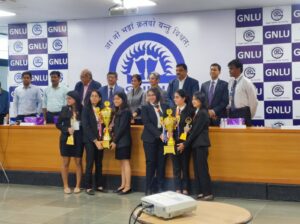
Quarter finalists
- Symbiosis Law School, Pune
- Royal Institute of Law and Economics, Cambodia
- ILS Law College, Pune
- Institute of Law, Nirma University, Ahmedabad
Semi Finalists
- National Law Institute University, Bhopal
- National Law School of India University, Bangalore
Best written Submissions
Institute of Law, Nirma University, Ahmedabad
Second best written submission
Royal Institute of Law and Economics, Cambodia
Best Researcher
Priyanshi Kothari, National Law School of India University, Bangalore
Second Best Researcher
There was a tie between Aditi Vivekanand, Symbiosis Law School, Pune & Anjali Sinha, Army Institute of Law, Mohali
Best Orator (Prelims)
Barath Arjun BK, National Law School of India University, Bangalore
Second Best Orator (Prelims)
KS Arartik, Dr. Ram Manohar Lohiya National Law University, Lucknow
Best Orator (Finals)
Ishita Singh, NALSAR University of Law, Hyderabad
With this, the live blogging team of GIMC 2023
(Akshata Modi, Trisha Sharma, Abhishek Wadhawan)
signs off. See you next year!


